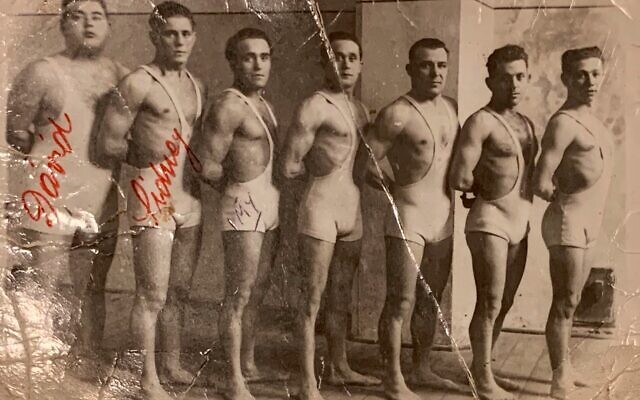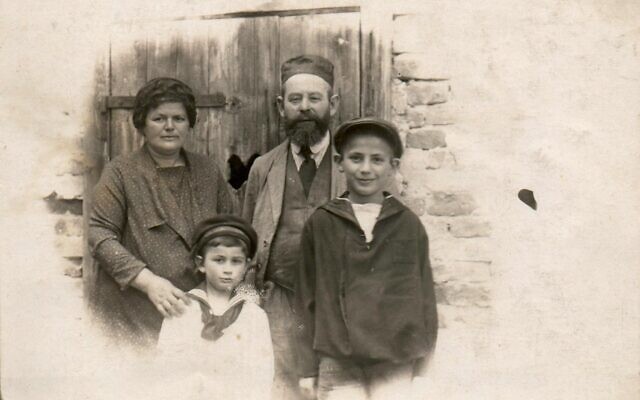People thought twice about messing with the Unreich brothers in Bratislava, Czechoslovakia. There were seven sons in the family, and six of them were wrestlers. Some won national and international titles.
Zalman, the sixth child, and fifth son in the family, was the Slovak wrestling champion (welterweight division) in 1927 and took first place in Greco-Roman wrestling (heavyweight division) in the 1935 Maccabiah Games. After immigrating to Palestine in the early 1930s, he was instrumental in developing the sport in the country.
Until recently, this was about all Zalman’s grandson David M. Baron knew about him. Unfortunately, Zalman (who Hebraized his last name to “On,” pronounced “ohn,” meaning strength) died in 1978 at age 66, when Baron was just a toddler. (Baron’s last name is an Anglicization of Bar-On, literally “son of strength” or “powerful,” which was adopted by Baron’s father when he moved to the United States.)
To Baron’s amazement, a trove of materials On left behind revealed that his wrestling prowess was only part of his legacy. For much of his life, he used his skill and power — physical and otherwise — to help fellow Jews in danger. Many of these activities were done secretly and through back channels, so On rarely received recognition for them.

Zalman Unreich wearing some of his wrestling medals c. early 1930s. He won the Slovak wrestling championship (welterweight division) in 1927, and first place in Greco-Roman wrestling in the 1935 Maccabiah Games (heavyweight division). (Courtesy of David Baron)
“Zalman was always a mystery — no one knew where he came from or what his next move might be; one moment he appeared to enter a room and the next nobody seemed to know where he went,” Baron said.
Baron, 44, turned his discoveries about On into a semi-fictional spy thriller titled, “The Undercover Wrestler: The Untold Story of an Undercover Hero of Israel.” Chapters spinning an espionage tale featuring a heroic On alternate with supporting historical and biographical information based on Baron’s research.
The book is accompanied by a website designed by Baron, who lives in the Baltimore area and is an IT manager at Johns Hopkins University and Health System. The website is full of archival photos and helpful contextual content Baron found among family materials and in archives in different countries.
The plot of “The Undercover Wrestler” is fanciful, but it is grounded in Baron’s discovery that On was an Israeli diplomat in Prague in the late 1940s and early 1950s, where he was involved in arms deals and training crucial to the nascent State of Israel’s survival.
“He was part of such an instrumental team. Israel wouldn’t be around if it weren’t for those arms,” Baron said.
On also ran a clandestine rescue operation, smuggling funds for Jewish war refugees into Czechoslovakia, and smuggling out of the Communist bloc to Israel or the West, Jews and sacred Jewish items. There is also evidence that he helped some Catholic monks escape to the US. On was officially in charge of security at the Israeli legation in Prague, but it was a front for his undercover work, said his grandson.
“He was a hero. His legacy is one of helping those who can’t rescue themselves out of difficult situations” Baron said.
Putting his fists where his mouth was

ŠK Makkabea Bratislava Sports Club c. late 1920s or early 1930s. On left are David Unreich, Zalman Unreich and Krav Maga founder Emrich (Imi) Liechtenfeld. (Courtesy of David Baron)
On’s willingness to put himself on the line to help fellow Jews began early. As a teenager, he was a member of a group that patrolled Bratislava’s streets and defended Jews against attacks by non-Jewish gangs (his friend, Krav Maga founder Imi Lichtenfeld, was also involved). He was also part of a network within Bratislava’s Jewish community helping post-World War I refugees from the Pale of Settlement cross safely into Austria.
The Unreich parents, Sulim and Regina, would shelter refugees, and their sons would then lead them to unguarded points where they could cross the nearby border with Austria undetected.
Although Sulim and Regina were staunchly anti-Zionist Orthodox Jews, they and their children helped many young people on their way to Palestine. Eventually, some of the Unreich sons themselves left for the Holy Land. On’s older brother Shlomo was already there when he arrived.

Photo of David ‘Duffi’ Ben Shalom (Unreich) (1907-1957) that he sent to his brother Zalman. David was a European wrestling champion and also competed at high levels in the US, with matches in premium venues such as Madison Square Garden. (Courtesy of David Baron)
Fortunately, all seven Unreich sons made it out of Europe to Israel, Australia or America before the Holocaust. The parents visited Palestine in 1936 for Shlomo’s wedding, but ignored their sons’ pleas for them to stay. They returned to their leadership roles in the Bratislava Jewish community, and were eventually killed in Auschwitz along with their only daughter Reitzi (Theresa), her husband, and their two young daughters.
Two of the Unreich brothers who immigrated to the US before the war are of particular interest. Eldest brother David Unreich (who used the professional alias Ben Shalom) was a successful heavyweight professional wrestler before dying at age 50.
Moshe Unreich changed his name to Maurice Enright and assumed Jewish leadership positions. He traveled several times to Europe after the war as a representative of the Va’ad Hatzala and Rescue Children organizations, playing a key role in purchasing a site in Hennonvile, France, for the care of Jewish orphans. Enright and his wife also adopted a girl who had been orphaned during the Holocaust.

Maurice Enright (Moshe Unreich) ( at center with white hat) with children, many orphaned, near the Jan Hus Memorial Statue in the Old Town Square, Prague, c. 1949. (Courtesy of David Baron)
In the promised land
After arriving in Tel Aviv in the early 1930s, On initially worked as a laborer. However, after wrangling space in the Histadrut headquarters in Tel Aviv to set up a wrestling gym and program, he was quickly tapped to head up security for the Histadrut’s executive committee from 1938 to 1947.
On, who married his wife Gertie in 1940, was a also member of the pre-state Haganah paramilitary organization. He was assigned to special projects cooperating with the British, and also helped train Jewish paratroopers (including his first cousin Zvi Ben Yaakov) to be dropped behind enemy lines in Europe. Given his origins, he was assigned to work with four known as the “Slovak Quartet.”

Zalman (front right) with ‘Slovak Quartet’ paratroopers he helped train in 1940s. Woman in the middle may be Haviva Reik along with Surica Braverman and Zvi Ben Yaakov in back and possibly Reuven Dafni on right. (Courtesy of David Baron)
Israel’s foreign ministry recalled On and his family from Prague, where he had been a member of the diplomatic mission in the late 1940s and early 1950s, following the Slánský trial, an anti-Semitic show trial that took place in 1952. Fourteen members of the Communist Party of Czechoslovakia, including first secretary Rudolf Slánský, were charged with conspiracy and high treason. All 14 defendants were found guilty, with most sentenced to death and executed.
On took with him the key to former Czechoslovakian foreign minister Jan Masaryk‘s country cottage. Masaryk was a great supporter of Zionism and the new State of Israel. Before his death under suspicious circumstances in 1948, he invited On and other members of the Israeli legation and their families to use his cottage, and they continued to do so after his death. On was in charge of the key.

Key to Jan Masaryk’s cottage in Davle, Czech Republic given to Zalman Unreich (On). (Courtesy of David Baron)
Before his return to Israel, On made sure to locate the graves of Jewish paratroopers Haviva Reik and Zvi Ben Yaakov, his cousin, who were killed in Europe in 1945.
On was able to deduce that they had not been buried in a mass grave as had been reported, and found their graves in a military cemetery, where they had been buried under code names given them by the British. First, On arranged for the crosses on the graves to be replaced by Stars of David. Then he arranged for Reik and Ben Yaakov’s remains to be repatriated to Israel. There are photos of On with key dignitaries at the re-internment ceremony at Israel’s national military cemetery on Mt. Herzl in Jerusalem.

Zalman Unreich (On), far left, aids in the transfer of the remains of Israeli paratroopers Haviva Reik and Zalman Unreich’s cousin Zvi Ben Yaakov, who were killed in 1945 behind enemy lines, for reburial in Israel. (Courtesy of David Baron)
Chance discovery
“I’m so glad my father kept my grandfather’s materials and that I have been able to shed light on his accomplishments. I’ve learned things that my father and other relatives didn’t know,” Baron said.
Among the helpful resources Baron located was On’s Czechoslovakian Secret Police file. However, he can’t access some files in Israel to help answer remaining questions, as relevant documents from Israel’s secret services will not be declassified until decades from now.
There’s one mystery Baron hopes to solve without having to wait that long.

Zalman Unreich (On) greets friends Frank Sinatra and his wife Barbara upon their arrival to Israel, c. 1970s. (Courtesy of David Baron)
“We found these old newsreel clips showing my grandfather greeting Frank Sinatra as he stepped off the plane on his visits to Israel in the 1960s and 1970s,” Baron said.
On worked during this period for the government-affiliated Histadrut Tourist & Travel Company, welcoming and providing security for visiting VIPs. But Baron believes Sinatra’s warm embrace of On signals something more.
“The way they hug each other makes me sure that there was a real friendship there. I just don’t know yet what the full story behind that is,” he said.
 RSS Feed
RSS Feed















 February 13th, 2021
February 13th, 2021  Awake Goy
Awake Goy 


 Posted in
Posted in  Tags:
Tags: 













